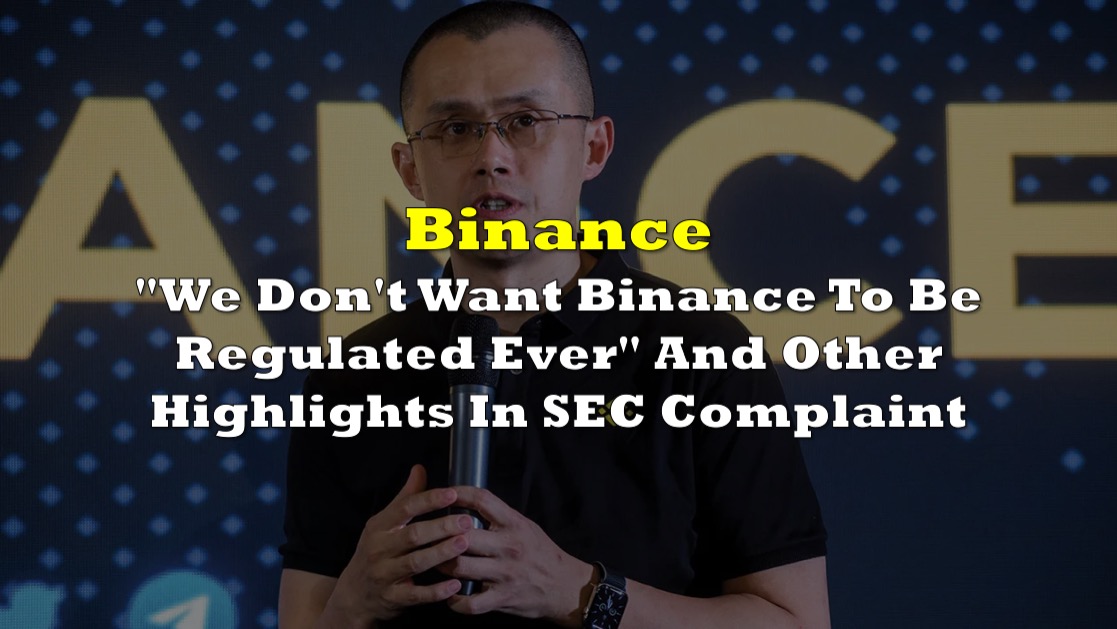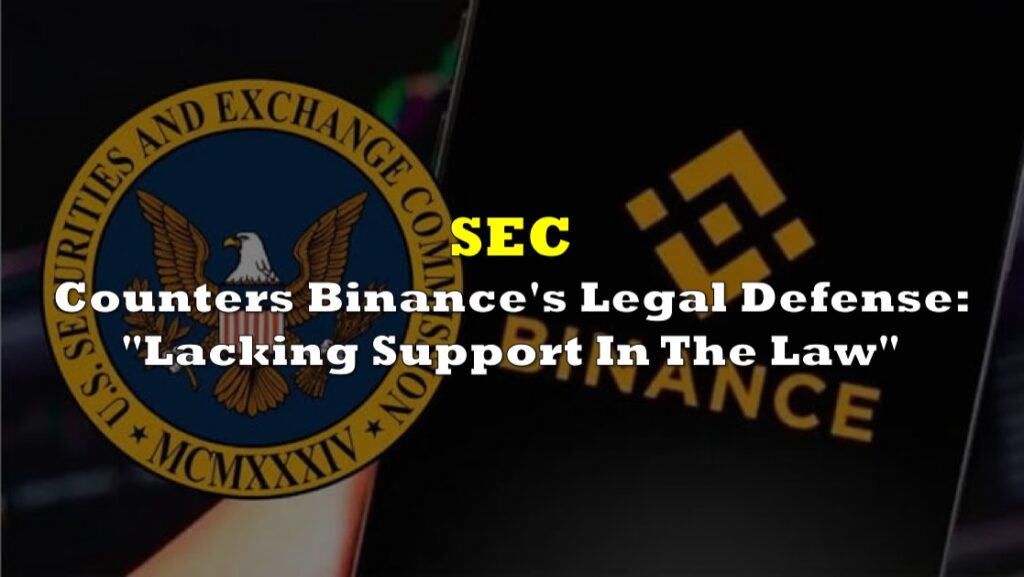The Securities and Exchange Commission (SEC) has filed a significant lawsuit against Binance, the world’s largest cryptocurrency exchange. The SEC accuses Binance of mishandling customer funds and deceiving American regulators and investors about its operations. This legal action could have far-reaching implications for the crypto industry’s power dynamics and wealth distribution.
This is the second time this year that Binance has faced allegations from federal regulators for evading investor protection laws in the United States. The SEC has long viewed Binance as a major target in its efforts to regulate the crypto industry, which has historically embraced an anti-government stance. With an average daily trading volume of $65 billion, Binance has become a focal point for regulatory scrutiny.
The SEC’s complaint, spanning 136 pages, outlines Binance’s practice of commingling billions of dollars in customer funds and secretly transferring them to a separate company called Merit Peak Limited, which is controlled by Binance’s founder, Changpeng Zhao. Additionally, the complaint alleges that Binance misled investors about its ability to detect and prevent manipulative trading, as well as its efforts to restrict U.S. users from trading on its international platform.
Binance.US, a separate company created specifically for U.S. operations, was intended to provide access to U.S.-based customers.
“We do not want Binance to be regulated ever”
In the SEC complaint, the agency cited Binance’s Chief Compliance Officer admitting that “we do not want [Binance].com to be regulated ever.”
“Starting in or around 2018, determined to escape the registration requirements of the federal securities laws, Defendants—under Zhao’s control—designed and implemented a multi-step plan to surreptitiously evade U.S. laws,” said the complaint.
I am once again reminding criminal enterprises that if they're going to have a plan to break the law, they should not write it down in places that are discoverable… because it does not look good on paper. pic.twitter.com/VJ0kysXn2R
— Chairman Birb Bernanke, NJ edition (@Bonecondor) June 5, 2023
While Binance announced that it was implementing controls to block U.S. customers from the Binance.com platform when it launched its U.S. platform in 2019, the agency said that Zhao “directed Binance to assist certain high-value U.S. customers in circumventing those controls.”
“As Zhao himself acknowledged—Binance did not want to ‘be held accountable’ for these actions. As the Binance CCO explained, ‘[o]n the surface we cannot be seen to have US users[,] but in reality, we should get them through other creative means,'” said the agency in the complaint.
“Team feels being duped like a puppet”
The SEC’s civil lawsuit asserts that Binance and Changpeng Zhao “enriched themselves by billions of U.S. dollars while placing investors’ assets at significant risk.”
In addition, the SEC claims that Zhao and Binance maintained control of customer assets, enabling them to mix or divert customer assets, including to Sigma Chain, an entity owned and controlled by Zhao. BAM Trading and BAM Management US Holdings, affiliates of Binance, are also accused of lying to investors about trading controls over the Binance.US platform that ended up being non-existent. Furthermore, the SEC alleges that Binance and Zhao secretly pooled billions of dollars of investor assets and sent them to Merit Peak Limited, a third party company also belonging to Zhao.
Binance and BAM Trading are accused of “operating as unregistered national securities exchanges, broker-dealers, and clearing agencies,” as well as offering and selling BNB, Binance USD, and staking-as-a-service programs without adequately registering the products as per federal securities laws. Zhao is additionally charged as a control person for these alleged operations.
“BAM Trading employees referred to Zhao’s and Binance’s control of BAM Trading’s operations as ‘shackles’ that often prevented BAM Trading employees from understanding and freely conducting the business of running and operating the Binance.US Platform—so much so that, by November 2020, BAM Trading’s then-CEO told Binance’s CFO that her ‘entire team feels like [it had] been duped into being a puppet.’”
The SEC has repeatedly gone out of it's way and taken the time to provide receipts. You could simply not have stated anything about credibility. If you do, and then break the law, again… this shit does not look good on paper. pic.twitter.com/SG9y0ieBqm
— Chairman Birb Bernanke, NJ edition (@Bonecondor) June 5, 2023
“We are operating as a f**king unlicensed securities exchange”
The SEC claimed that Zhao and Binance were well aware that they were operating the Binance.com platform in violation of several US laws, including US securities laws, and that these ongoing violations posed existential threats to their business.
“As Binance’s CCO bluntly admitted to another Binance compliance officer in December 2018, ‘we are operating as a fking unlicensed securities exchange in the USA bro’,” the agency said.
The regulatory body also noted that Zhao and Binance hired several advisors to advise them on managing their U.S. legal exposure in 2018, one of which was a consultant who operated a crypto asset trading firm in the United States. The consultant recommended steps to “insulate Binance from US Enforcement,” including having “key Binance personnel continue to operate from non-US locations to avoid enforcement risk” and ensuring that “cryptocurrency wallets and key servers continue to be hosted at non-US locations to avoid asset forfeiture.”
“As to the SEC, the Binance Consultant also recommended that, ‘just for publicity,’ the Tai Chi entity should ‘release a long and detailed Howey Test Asset-Evaluation Framework … to show Howey test sophistication’ and then engage with the SEC to discuss the ‘formation or acquisition of a broker/dealer or alternative trading system, with no expectation of success and solely to pause potential enforcement efforts,’” the agency added in the complaint.
There are Easier Ways to get good publicity than explicitly poking around in the legal space for shits and gigs, and probably easier ways to lobby for easier regulations and penalties, but sure, just try the "flood them with paper" route pic.twitter.com/2r1qfe5MoR
— Chairman Birb Bernanke, NJ edition (@Bonecondor) June 5, 2023
“Where you get that kind of money?”
Furthermore, the SEC alleges that Binance and Zhao secretly pooled billions of dollars of investor assets and sent them to Merit Peak Limited, a third party company also belonging to Zhao.
Binance’s finance team was also able to execute significant fund transfers without BAM Trading’s awareness due to its control over BAM Trading’s bank accounts. For example, in June 2020, when BAM Trading’s first CEO was informed that BAM Trading’s internal transfers had increased from approximately $10 million per day to $1.5 billion per day, BAM’s CEO had no knowledge of such transfers, was unable to verify them due to a lack of appropriate account access, and was forced to inquire with Binance (a purportedly separate and distinct company) about the transfer of billions of dollars in BAM Trading’s own accounts.
Similarly, Binance moved $17 million from BAM Trading’s bank accounts to Merit Peak in December 2020. After learning of the transfer, BAM’s CEO enquired with Binance staff about it and discovered that the move was related to Merit Peak’s trading on the Binance.US Platform.
“BAM CEO responded, ‘thanks – helpful. Just had to get explanation anytime someone breaking our limits with massive withdraw[als] I have to ask – where you get that kind of money? And where is it going? . . . haha [I’m] on a wild goose chase to make sure we have knowledge of where $17M is moving around’,” the agency cited in its complaint.
According to the SEC, these crypto assets are not all in the exclusive custody and control of BAM Trading professionals in the United States as of the beginning of June 2023.
“This arrangement has given and continues to give Zhao and Binance free reign to handle billions of dollars of crypto assets that customers have deposited, held, traded, and/or accrued on the Binance.US Platform with no oversight or controls to ensure that the assets are properly secured,” they added.
It's 2023. Do you know where your Binance Assets are? pic.twitter.com/KqPcvR19bm
— Chairman Birb Bernanke, NJ edition (@Bonecondor) June 5, 2023
In the subsequent year, the company audit firm’s examination revealed ongoing concerns regarding the control measures for the custody of digital assets. On May 20, 2022, in its third communication outlining these weaknesses, the audit firm determined that BAM Trading had limited visibility into the on-chain activity associated with its exchange.
“Similarly, the Audit Firm concluded that it ‘was difficult and sometimes not possible to pull wallet balances en masse as of a historical point in time. This makes it very difficult to ensure the Company is fully collateralized at specific points in time’,” said the complaint.
The audit firm did not continue its engagement with the company after November 2022.
BAM Trading did not even develop a formal policy for the custody and operation of crypto assets until May 15, 2023, the SEC said. The firm was in charge of about $1.77 billion in crypto assets belonging to Binance.US Platform customers as of the end of 2022.
“Project 1776 is for our independence”
As time passed, employees at BAM Trading grew more discontented with the lack of autonomy and significant influence exerted by Zhao and Binance over the company’s daily activities and the Binance.US Platform.
In January 2020, these employees began creating a list of “shackles” that represented functions or processes that necessitated input, access, approval, or funding from Binance personnel. This list served as evidence of BAM Trading’s limited independence and lack of understanding regarding the platform’s operations.
BAM’s CEO later reported to the Binance CFO that her “entire team is at their breaking point.” The Binance CFO later remarked that “getting our independence takes time.”
During the following months, BAM’s CEO collaborated with her team to develop a strategy aimed at increasing BAM Trading’s control over its operations. In October 2020, she requested BAM Trading employees to outline their job functions that involved “global touchpoints,” referring to areas where they relied on the .com platform in their processes. After reviewing the gathered information, BAM’s CEO observed, “It seems like there are numerous .com gatekeepers involved in your tasks.”
“BAM CEO dubbed this effort ‘Project 1776.’ As she told another BAM Trading employee in October 2020, ‘Project 1776 is for our independence’,” the complaint said.
Is it good when your back office won't tell you what they do on a day to day basis pic.twitter.com/PcYQiTmnQD
— Chairman Birb Bernanke, NJ edition (@Bonecondor) June 5, 2023
Despite the efforts made by BAM Trading for greater independence, Binance remained resistant. This resistance was evident in an incident on December 3, 2020, when BAM’s CEO reported to the Binance CFO that their ongoing struggle revolved around Binance’s clearing personnel refusing to provide information about their day-to-day activities and access. The Binance Back Office Manager and another Binance employee were particularly uncooperative, unwilling to share their screens and dismissing the need for transparency regarding their daily tasks.
Another instance highlighting Binance’s control came around March 2021 when Zhao made the decision to replace BAM’s CEO with a successor. By May 2021, the new CEO officially assumed the position, solidifying Binance’s influence over BAM Trading’s leadership.
“The lower the fees for a [market maker], the easier it might be to manipulate the market”
The complaint noted that when the Binance.US platform launched in September 2019, BAM Trading— contrary to its public statements—had no controls to monitor for and prevent manipulative trading on the Binance.US Platform, and through at least February 2022, it had implemented no such trade surveillance or controls.
Furthermore, when BAM Trading reported trading volume without disclosing the extent of the wash trading that they were aware of on the Binance.US platform they misled investors into believing that the platform’s trading volumes were robust, real, and reliable.
Wash trading refers to a fraudulent practice wherein a trader conducts buying and selling transactions of the same asset within their own accounts, without any genuine economic purpose. This type of trading activity is not driven by market forces such as supply and demand, and it lacks the characteristics of arm’s length market transactions. The primary aim of wash trading is to create an illusion of increased trading volume, liquidity, and trading interest for the specific asset involved. Additionally, it can artificially inflate the overall trading volume of the platform on which the asset is being traded.
In August 2019, a Binance co-founder and the leader of the Binance team responsible for managing the MatchBox trade matching engine utilized on Binance platforms communicated with BAM’s CEO and senior Binance executives: “the current matching engine allows a user to trade with themselves” and requested clarification on whether this practice aligns with the applicable US/SEC regulations that must be followed.
He also further acknowledged that “the manipulation angle comes from the fact it will make the traded volume increase when funds did not in fact trade hands,” but clarified that this primarily relates to compliance and regulation. The Binance co-founder stated that if any US compliance or regulation necessitates preventing such behavior, they will adhere to it; otherwise, they will not.
Sometime in July 2020, a Binance employee “who manages market surveillance” replied to an inquiry by a BAM Trading compliance employee that Binance had a team monitoring for market manipulation for the Binance platforms, but the team did “not monitor for wash trading, front running and spoofing” on the Binance.US platform.
“Moreover, in January 2021, BAM Trading’s Director of Institutional Sales informed [the first] BAM CEO that ‘[a]pparently we have nothing in place to prevent wash trading? Just tested myself, sold market order into my own bid.’ He then warned that he was ‘not sure if this is being exploited on any level. The lower the fees for a [market maker], the easier it might be to manipulate the market’,” the complaint read.
Another BAM Trading employee responded, “Yikes.”
Binance calls their wash traders, market makers.
— Bitfinex’ed 🔥🐧 Κασσάνδρα 🏺 (@Bitfinexed) June 5, 2023
I've said for years that these are not market makers, they are market fakers. Just more evidence that I've been right about wash trading on Tether fraud exchanges.
Only fraudulent exchanges would list blatant frauds on their… pic.twitter.com/yrfdnuXHYZ
“Binance is an easy target now”
Binance responded to the lawsuit with a blog post stating its disappointment with the SEC’s decision, characterizing it as a misguided refusal to provide clarity and guidance to the digital asset industry. Binance vows to vigorously fight back against the charges. The company also highlights that the SEC rushed to file the lawsuit shortly after serving 26 new document requests to Binance.
“The SEC’s actions here appear to be in service of an effort to rush to claim jurisdictional ground from other regulators – and investors do not appear to be the SEC’s priority. Because of our size and global name recognition, Binance is an easy target now caught in the middle of a U.S. regulatory tug-of-war,” the firm said.
These charges from the SEC represent the latest efforts by U.S. regulators and prosecutors to rein in the unregulated nature of crypto trading. Sam Bankman-Fried, the founder of FTX, a major competitor to Binance until its bankruptcy filing in November, is scheduled to face trial in October for fraud and other charges. In recent months, the SEC has imposed fines and penalties on crypto lending firms as part of its campaign for compliance with U.S. laws. The SEC asserts that most crypto tokens issued by exchanges like Binance and FTX should be treated as securities under federal law.
In summary, the SEC’s lawsuit against Binance is a significant development in the regulatory landscape of the cryptocurrency industry. It highlights alleged misconduct by Binance, including mishandling customer funds, deceiving regulators and investors, and engaging in unauthorized operations. Binance’s response suggests a vigorous defense against the charges. The outcome of this case will shape the future regulatory framework for crypto trading in the United States and potentially influence the global crypto industry as well.
Finished reading the charging document. The SEC is the least of CZ’s concerns. pic.twitter.com/77heenuaS1
— Doomberg (@DoombergT) June 5, 2023
Information for this briefing was found via the sources mentioned. The author has no securities or affiliations related to this organization. Not a recommendation to buy or sell. Always do additional research and consult a professional before purchasing a security. The author holds no licenses.









